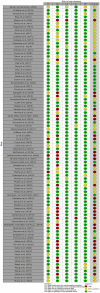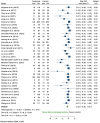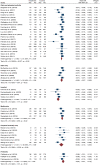Interventions in preconception and pregnant women at risk of gestational diabetes; a systematic review and meta-analysis of randomised controlled trials
- PMID: 38178175
- PMCID: PMC10765912
- DOI: 10.1186/s13098-023-01217-4
Interventions in preconception and pregnant women at risk of gestational diabetes; a systematic review and meta-analysis of randomised controlled trials
Abstract
Background: Women at risk of gestational diabetes mellitus (GDM) need preventative interventions.
Objective: To evaluate targeted interventions before and during pregnancy for women identified as being at risk of developing GDM.
Methods: Systematic review and meta-analysis conducted following PRISMA guidelines. MEDLINE, EMBASE and the Cochrane Library in addition to reference and citation lists were searched to identify eligible randomised controlled trials (RCTs) utilising risk stratification during the preconception period or in the first/early second trimester. Screening and data extraction were carried out by the authors independently. Quality assessment was conducted based on the Cochrane risk-of-bias tool. Random effects meta-analysis and narrative synthesis were performed.
Results: Eighty-four RCTs were included: two during preconception and 82 in pregnancy, with a pooled sample of 22,568 women. Interventions were behavioural (n = 54), dietary supplementation (n = 19) and pharmacological (n = 11). Predictive factors for risk assessment varied; only one study utilised a validated prediction model. Gestational diabetes was reduced in diet and physical activity interventions (risk difference - 0.03, 95% CI 0.06, - 0.01; I2 58.69%), inositol (risk difference - 0.19, 95% CI 0.33, - 0.06; I2 92.19%), and vitamin D supplements (risk difference - 0.16, 95% CI 0.25, - 0.06; I2 32.27%). Subgroup analysis showed that diet and physical activity interventions were beneficial in women with ≥ 2 GDM risk factors (risk difference - 0.16, 95% CI 0.25, - 0.07; I2 11.23%) while inositol supplementation was effective in women with overweight or obesity (risk difference - 0.17, 95% CI 0.22, - 0.11; I2 0.01%). Effectiveness of all other interventions were not statistically significant.
Conclusions: This review provides evidence that interventions targeted at women at risk of GDM may be an effective strategy for prevention. Further studies using validated prediction tools or multiple risk factors to target high-risk women for intervention before and during pregnancy are warranted.
Keywords: Diet; Dietary supplement; Gestational diabetes; Intervention; Meta-analysis; Physical activity; Preconception; Pregnancy; Randomised controlled trials; Systematic review.
© 2024. The Author(s).
Conflict of interest statement
The authors declare no conflict of interest.
Figures













Similar articles
-
Folic acid supplementation and malaria susceptibility and severity among people taking antifolate antimalarial drugs in endemic areas.Cochrane Database Syst Rev. 2022 Feb 1;2(2022):CD014217. doi: 10.1002/14651858.CD014217. Cochrane Database Syst Rev. 2022. PMID: 36321557 Free PMC article.
-
Interventions to prevent women from developing gestational diabetes mellitus: an overview of Cochrane Reviews.Cochrane Database Syst Rev. 2020 Jun 11;6(6):CD012394. doi: 10.1002/14651858.CD012394.pub3. Cochrane Database Syst Rev. 2020. PMID: 32526091 Free PMC article.
-
Dietary supplementation with myo-inositol in women during pregnancy for treating gestational diabetes.Cochrane Database Syst Rev. 2016 Sep 7;9(9):CD012048. doi: 10.1002/14651858.CD012048.pub2. Cochrane Database Syst Rev. 2016. PMID: 27602537 Free PMC article. Review.
-
Effects of mHealth-Based Lifestyle Interventions on Gestational Diabetes Mellitus in Pregnant Women With Overweight and Obesity: Systematic Review and Meta-Analysis.JMIR Mhealth Uhealth. 2024 Jan 17;12:e49373. doi: 10.2196/49373. JMIR Mhealth Uhealth. 2024. PMID: 38231555 Free PMC article.
-
Antenatal dietary supplementation with myo-inositol for preventing gestational diabetes.Cochrane Database Syst Rev. 2023 Feb 15;2(2):CD011507. doi: 10.1002/14651858.CD011507.pub3. Cochrane Database Syst Rev. 2023. PMID: 36790138 Free PMC article. Review.
Cited by
-
Prevalence and risk factors of gestational diabetes mellitus among pregnant women in northern Vietnam: a cross-sectional study.Glob Health Action. 2025 Dec;18(1):2460339. doi: 10.1080/16549716.2025.2460339. Epub 2025 Feb 10. Glob Health Action. 2025. PMID: 39925195 Free PMC article.
-
Effect of myo-inositol on the prevention of gestational diabetes in high-risk pregnant women: An RCT.Int J Reprod Biomed. 2025 Jun 10;23(4):323-332. doi: 10.18502/ijrm.v23i4.18784. eCollection 2025 Apr. Int J Reprod Biomed. 2025. PMID: 40766851 Free PMC article.
-
Evaluating acceptability and experiences of pregnant women at high risk of developing gestational diabetes who take part in antenatal intervention trials: a qualitative systematic review.BMC Pregnancy Childbirth. 2025 Jul 12;25(1):754. doi: 10.1186/s12884-025-07854-z. BMC Pregnancy Childbirth. 2025. PMID: 40652192 Free PMC article.
-
The long-term general practice healthcare of women with a history of gestational diabetes: A Scoping Review Protocol.HRB Open Res. 2025 Apr 10;8:31. doi: 10.12688/hrbopenres.14022.2. eCollection 2025. HRB Open Res. 2025. PMID: 40225808 Free PMC article.
-
25-Hydroxyvitamin D, Vitamin D Binding Protein and Gestational Diabetes Mellitus: A Two-Sample Mendelian Randomization Study.Nutrients. 2024 Aug 7;16(16):2603. doi: 10.3390/nu16162603. Nutrients. 2024. PMID: 39203740 Free PMC article.
References
-
- Wang H, Li N, Chivese T, Werfalli M, Sun H, Yuen L, et al. IDF diabetes atlas: estimation of global and regional gestational diabetes mellitus prevalence for 2021 by international association of diabetes in pregnancy study group’s criteria. Diabetes Res Clin Pract. 2022;183:109050. doi: 10.1016/j.diabres.2021.109050. - DOI - PubMed
Publication types
Grants and funding
LinkOut - more resources
Full Text Sources

